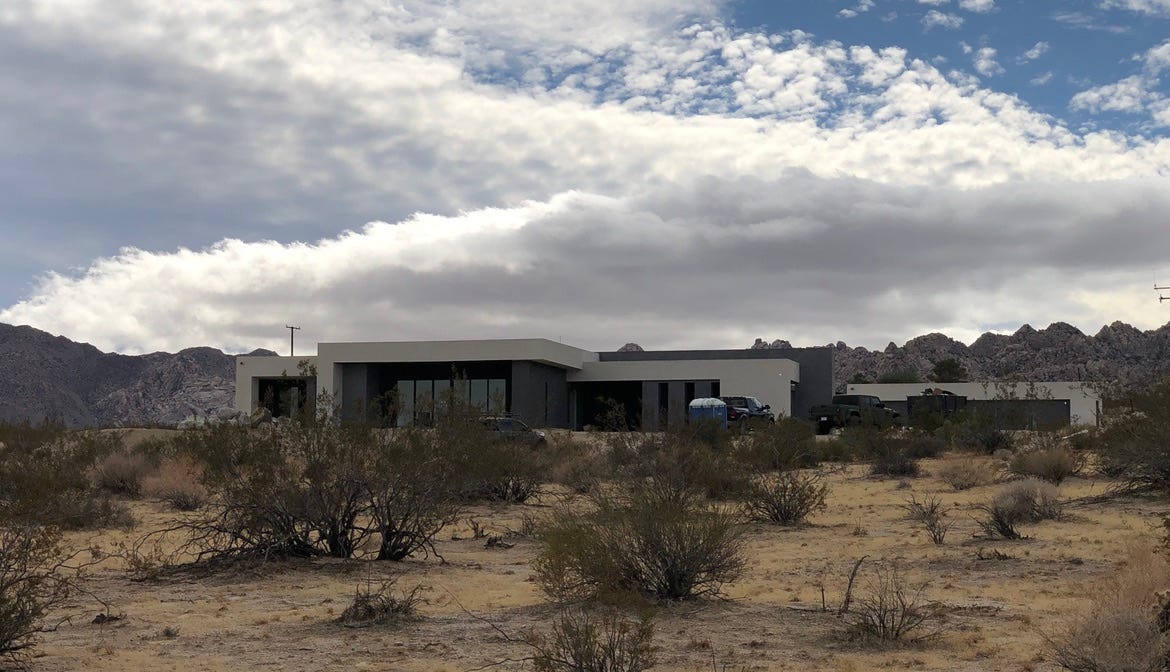THE EVOLUTION OF SHORT TERM VACATION RENTALS
Why the Evoque / Fieldtrip STR model is fundamentally different than any other STR

Remember when national and international investors were buying up residential homes and flipping them into short-term vacation rentals (STRs) and listing them on Airbnb or Vrbo? That’s sooooo 2020. The new trend? Investors joining together in complicated webs of LLCs to purchase empty in-fill lots in residential neighborhoods, build structures that are designed to be short-term vacation rentals from the ground up, then form management companies to maintain and rent them.
This is the model used by Fieldtrip Hospitality LLC, an STR management company led by Josh Seigel, which recently opened an office in Yucca Valley with 15 employees and is, along with Evoque Modern LLC, in the process of building and permitting several structures in the Indian Cove neighborhood of Twentynine Palms. One of the principals of Fieldtrip Modern LLC, Dan Tseng, is also the principal of Evoque Modern LLC, the company that purchases the land, and builds the structures, which are then managed by Fieldtrip Hospitality. Blu Sequoia Modern, a corporation led by Marlow LaFountaine and registered in Nevada with offices in Banning, appears to be the entity contracted to build the structures. Seigel and LaFountaine are listed as owners on STR permits in Indian Cove which were pending as of November.
Where it all started…
Airbnb, originally named AirBed & Breakfast, was famously started in 2008 by Brian Chesky and Joe Gebbia, two guys renting an air mattress in their living room. The fundamental idea was brilliant – homeowners could make some extra change by renting a room or their entire residence when they were out of town using a centralized registry – Airbnb. People realized they could help cover the mortgage on a vacation home through renting it on Airbnb plus rent their residence when they were at their vacation home.
Soon local real estate agents and other local investors who were previously flipping homes discovered that they could make a greater return on their investment by marketing newly renovated homes as vacation rentals… with the result being that those homes were then removed from the residential real estate market. Some would argue that this is the point when STRs began to contribute to the current housing crisis.1
This was also the moment that neighborhoods and cities started to push back, requiring permits and limiting the number of permits one person or entity could hold or limiting short-term vacation rental permits to primary residences – or, as Atlanta has done, limiting them to primary residents plus one additional permit.2
Cities with few limits began to experience an even greater expansion of STR ownership with national and international investors buying up homes in places they had never even visited. Businesses specializing in STR management became more common in cities that required immediate responses to noise disruptions and other nuisance complaints emanating from vacationing guests in established neighborhoods. Additionally, Twentynine Palms, an economically disadvantaged area, has seen a rise in complaints from STR owners reporting their neighbors for homes they perceive as being in unacceptable condition.
The next phase…
Recently the Hi-Desert has seen the next phase in short-term rentals: national and international investors buying empty lots and building new structures designed to be operated as short-term rentals – the Evoque/Fieldtrip model. Fieldtrip promotes its custom built STRs as “Curated homes for group travel” which combine “the best aspects of a home with the brand promise of a high-end boutique hotel.”3
This model is so far away from where short-term vacation rentals started that one has to ask, should this vertical integration of the STR industry be allowed to proliferate in residential neighborhoods? Should investors be allowed to take advantage of Twentynine Palms’ STR ordinance and building codes to construct and operate “boutique hotels” in residential zoning? Should it be permissible for new single family residential construction to be permitted as an STR and immediately removed from the residential housing market during a housing crisis?
These are among the questions that will come before City Council at their first meeting of 2023 on January 10 when residents John and Kat Talley-Jones appeal the issuance of an STR permit for the new structure located at 68467 Sullivan Road in Indian Cove.
Have an opinion on this issue? Write City Council by noon on Tuesday, January 10, and cc the City Clerk. You can also leave a comment below or join Desert Trumpet writers in a live chat on the Substack app.




Testing the chat...and glad to see this out there.
which elected officials and/or unelected bureaucrats gave this organization the permit(s) to do this? Post their names and phone numbers. Be vigilant, fellow High Desert peers, you don’t want to become like the Low Desert with a proliferation of noisy, cluttering stvr(s) that destroy your neighborhoods’ desert ambiance. Seriously.